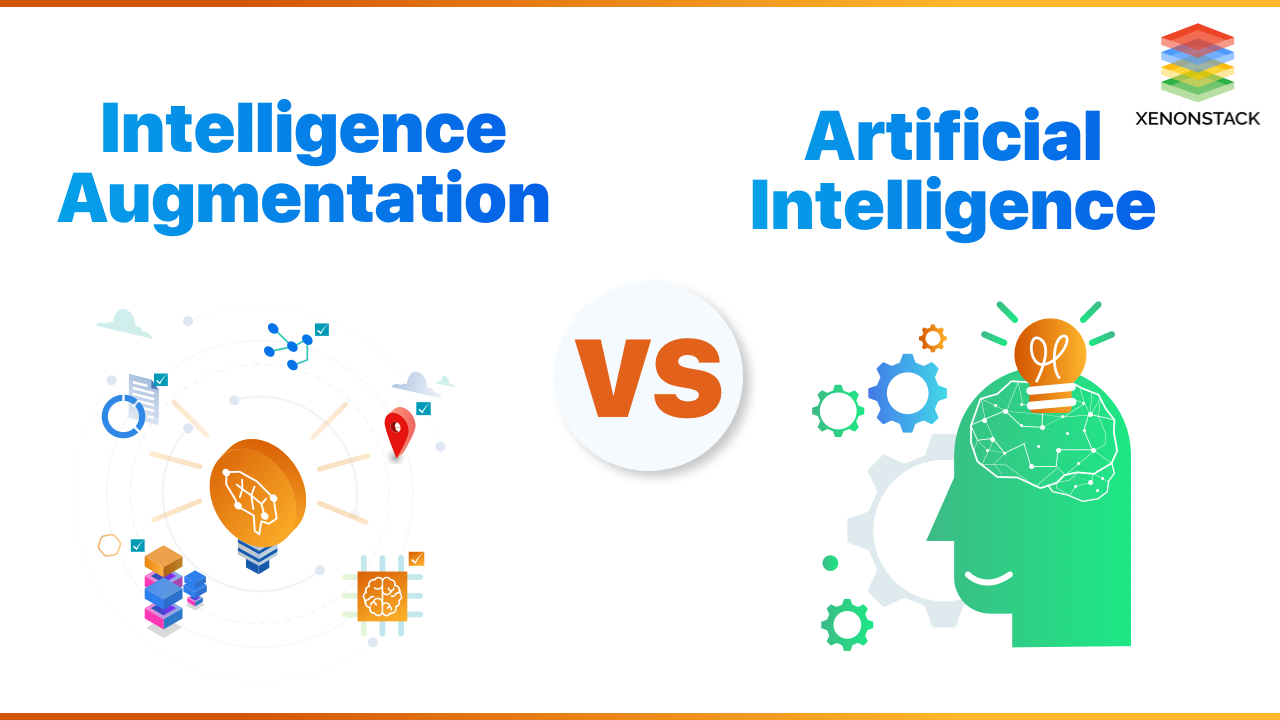
Introduction to Augmented Intelligence and Artificial Intelligence
Artificial intelligence has received so much attention recently that people believe some concern surrounds it. Many people still don't understand why they need it or what role it can play, and they're undoubtedly wondering, "Will it take our jobs?" There is a massive possibility for fields to take advantage of the latest AI technology. Still, there's an opportunity to concentrate on Intelligence Augmentation or IA, a phrase not everyone knows.
In a deeper dive into Augmented Intelligence vs. AI, it's now possible to learn the growing term 'Augmented Intelligence,' which will provide essential insights into the realities and fiction of AI.
A subfield of Artificial Intelligence(AI) devoted to researching and developing the distributed solutions. Click to explore about, Distributed Artificial Intelligence Latest Trends
What is Artificial Intelligence?
Artificial Intelligence, or AI, refers to the intelligence displayed by machines instead of humans. Defined focuses on work and reacts like a human to improve performance. It is trained to understand logic, problem-solving, planning, natural speech and face recognition, and knowledge, among other things.
What is Augmented Intelligence?
Augmented intelligence involves leveraging technology to boost human capabilities in executing tasks, conducting analyses, and making decisions. In this approach, machine learning and artificial intelligence (AI) systems are typically employed in a supportive capacity to assist humans rather than replace them. For instance, this might involve utilizing complex enterprise software to optimize business processes managed by humans, employing AI to aid in coding, or using a virtual assistant to help answer questions.
How does augmented intelligence work?
Augmented intelligence uses various technologies to help humans with their tasks. Tools that aid humans in tasks but don't involve AI, like data management software, are still considered augmented intelligence.
However, AI-enabled technologies commonly used in augmented intelligence include machine learning, deep learning, machine vision and natural language processing (NLP).
Machine learning and AI systems are usually trained with various learning methods, like supervised, unsupervised, semi-supervised, and reinforcement learning, all of which need lots of data to get going. This approach is similar to training a machine vision system to recognize images or an NLP system to understand human language and text. These AI-powered systems are designed to help with or automate specific tasks, and sometimes, they can even step in for a human role. For instance, an AI chatbot can be created to manage customer interactions, stepping in for a human agent.
Unlike traditional AI systems that aim to replace or fully automate tasks, augmented intelligence systems are designed to assist humans in their work. For instance, an AI chatbot can initially respond to a customer service request, ask the customer relevant questions, and then direct them to the appropriate human agent. Augmented intelligence systems can also perform the following functions:
- Gathering structured and unstructured data.
- Analyzing and interpreting data.
- Providing actionable data.
- Streamlining workflows by automating smaller, repetitive tasks.
Researchers in communication networks square measure are trapping into AI/ML techniques. Click to explore about, Role and Applications of AI in Telecom
Artificial Intelligence vs Augmented Intelligence
Artificial intelligence and intelligence enhancement are two buzzwords that we frequently use interchangeably. However, the difference between the two is explained. AI refers to a broader concept of machines humans consider intelligent to execute things. When technology supports and supplements human cognitive functions, it is called intelligence augmentation. Humans are at the centre of the system and decision-making in IA, whereas technology is at the centre of AI. Furthermore, IA systems can transcend the restrictions imposed on AI systems by system boundaries.
Artificial intelligence (AI) that supports and promotes human capabilities is Augmented Intelligence. Intelligence augmentation exemplifies AI's effect on increasing human creativity. On the other hand, Intelligence Augmentation can combine the results of AI algorithms and lead humans to improve their performance.
What are the Applications of Augmented Intelligence?
-
Augmented Intelligence-enabled customer analytics discover high-risk/high-potential customers: Customer analytics enabled by IA discover high-risk/high-potential customers: Seeing your customers leave isn't a great deal. However, you can keep them entertained by implementing IA in your systems. They can quickly identify which consumers are turning away and alert you to the situation alarmingly.
-
Forecasts Sales: Using AI-powered tools to collect historical data on a customer's previous purchases can assist the sales staff in making better decisions. It will also help find which product is the least and most desired. It can also predict which products will be advertised on a specific date, thus increasing your revenue.
-
A Greater Understanding of Data: You can now thoroughly comprehend the customer's data using IA-enabled solutions. You may now examine their previous purchasing patterns, determine what products and services they enjoy, and recommend their favourites based on the information provided.
AI in Banking is a joint process powered by chatbots and other automation technology, and for giving life to these techniques, machine learning and deep learning plays a vital role. Click to explore about, Benefits and Applications of AI in Banking
Use Cases of Augmented Intelligence
The nature of technology is that it learns and adapts quickly. AI will improve over time. This is a huge benefit for users. AI also transforms how companies interact with their customers and helps support onboarding, customer support, and consulting services. Let's take a look at some popular industries that apply Intelligence Augmentation.
Healthcare Sector
Intelligence Augmentation (IA) is popular in healthcare. It improves the quality of patient care and provides information on how providers can improve. IA also reduces the potential for medical errors typically associated with manual data entry and speeds up many time-consuming processes such as billing, payments, and claims.
Finance Sector
Financial services are complex; even the slightest mistake can impact a company's calculation. Intelligent technologies like IA allow businesses to manage their finances. IA enables financial planners to apply personalized service based on customer data, goals, and risks. IA also ensures that no manual errors occur.
Manufacturing Sector
Manufacturing involves complex processes that require human intervention, but technology can ease the burden of manual processes. Implementing IA in manufacturing can help speed up the design process. Workers can provide input parameters, and machines can design objects differently. IA increases efficiency by rapidly providing rich design options, allowing human workers to select the best options to deliver value to their customers.
Oil and Gas Sector
The oil and gas industry includes several complex processes, such as Excavation. With an IA-enabled system, companies can streamline their drilling process and get the right coordinates and measurements. Workers can seek out favourable environmental conditions to make operational decisions, and IA can start working on processes, resulting in less damage, faster work, and better accuracy.
Intelligence augmentation can be applied to many industries that intentionally mine big data. Here are some examples.
- Predict machine maintenance
- Predict customer behaviour and preferences
- Identify effective treatment options
- Identify market patterns
- Generate autopilot options
Intelligence Augmentation has limitless potential. The ultimate goal is to improve all employees' knowledge, expertise, and experience. It also aims to enable people to operate machines to understand, access, and interpret data of all kinds and to manage risk when making decisions in automation.

.webp?width=1921&height=622&name=usecase-banner%20(1).webp)


